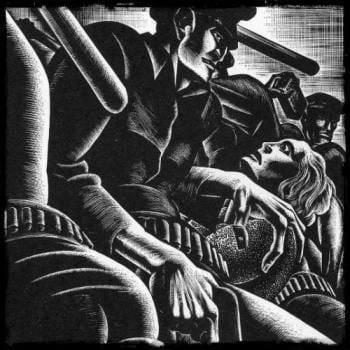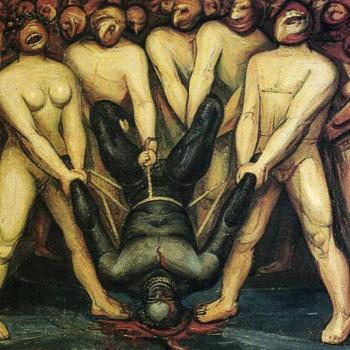
Two Washington Post essays, spaced apart by 31 months, bookend the ascent and arrival upon the judicial mountaintop of Neil Gorsuch.
In February of 2017, following the nomination of Neil Gorsuch by Donald Trump to replace Antonin Scalia on the Supreme Court bench, Princeton professor Robby George wrote in a Washington Post infomercial that we should ignore the haters on the left. That Neil Gorsuch, his good friend and intellectual brother-in-arms, was “an intellectual giant – and a good man.”
We are now in September of 2019, and The Post has published another weirdly promotional article on Gorsuch, who is fronting for his new book, A Republic, If You Can Keep It. This profile assesses Gorsuch’s “cannonball” impact on the Court – the 22 questions he asked at his inaugural oral argument, the volume of his written dissents (more than any other justice), the 337 pages of opinions, the confident disregard for judicial precedent – underscoring the clear impression that Gorsuch is a new breed of justice, brashly lacking in deference to his elders and to tradition, fully comfortable with the power at his fingertips, the offspring one might imagine unfurling were Antonin Scalia and Clarence Thomas to produce a child together. As the Post headline tells us, Gorsuch is “everything conservatives hoped for and liberals feared.”
Along the way, he has established himself as one of the court’s most conservative justices and a reliable vote for Trump initiatives that have reached the Supreme Court — the travel ban on those from mostly-Muslim countries, adding a citizenship question to the census form and allowing a ban on transgender service in the military to go into effect. He has shown a willingness to overturn precedent and an impatience with more reticent colleagues. More than anything, he has displayed a supreme confidence that his originalist approach to the law is the most disciplined and principled way to go about his job as a justice. “I’m all in, and I wanted to explain that,” Gorsuch said in a recent interview in his chambers.
In reality, Gorsuch is worth studying because (far more than his old high school chum Brett Kavanaugh) he illustrates what a federal judiciary dominated by attorneys birthed and cossetted within the insular folds of the Federalist Society will look like as the Senate’s Sorting Hat speeds Trump-appointed judges to federal courts that each increasingly resemble the Hogwarts House of Slytherin. Imbibing from Day One the insinuating logic of “natural law” and “originalist” and “textualist” methods, Gorsuch heralds a new era that transforms judges into priests of the occult who examine the entrails of ancient texts on behalf of ancient concepts of order that have almost nothing to do with the rule of law or the values of justice and equity or the lived experiences of Americans inhabiting a tottering planet in the 21st century.
Robby George Knows Neil Gorsuch
Some background is in order. In the letter of recommendation he wrote for Neil Gorsuch at the dawn of the Trump era, Robby George enumerates his friend’s qualifications to become a Supreme Court Justice. Here is what Robby George says.
- Robby George knows Neil Gorsuch. Because they are longtime friends and colleagues, George knows “firsthand” that “Gorsuch’s combination of outstanding intellectual and personal qualities places him in the top rank of American jurists.”
- Neil Gorsuch is an intellectual superstar. Measured by the “standards of intellect and education,” Gorsuch is an “off the charts intellectual superstar.”
- Neil Gorsuch is undogmatic. Perhaps sensitive to vague liberal unease about the Catholic intellectual undercurrents of the legal conservative movement, George hastens to tell us that Gorsuch “is not dogmatic, and his credentials explain why.” We learn these credentials include degrees from Columbia University, Harvard Law School, and Oxford University; Truman and Marshall Scholarships; doctoral thesis supervision from natural law philosopher John Finnis; Appeals Court and Supreme Court clerkships; and service himself for more than a decade as a judge on the 10th Circuit Court of Appeals.
- Neil Gorsuch is a Boy Scout. “If Democrats are looking for a point of vulnerability in either Gorsuch’s integrity or impartiality, they won’t find it. He is basically a Boy Scout. He’s a faithful husband, a good father, a caring neighbor, a generous friend, a man of probity who holds himself to the highest ethical standards.”
- Neil Gorsuch is an Episcopalian. “Oh, and he will bring religious diversity to a Court that is entirely Catholic and Jewish: He’s an Episcopalian.”
- Neil Gorsuch fully conforms to the Scalia mold. Gorsuch greatly admires Antonin Scalia. Like Scalia, Gorsuch is fully committed to “textualism” and “originalism,” the conservative jurisprudential methods canonized within the Federalist Society that tell us “the Constitution should be interpreted in a way that is faithful to the text and guided, where the text is less than perfectly clear in its application to a question, by the original understanding of its framers and ratifiers.”
- Neil Gorsuch will uphold the law. Despite being a “conservative intellectual giant,” Gorsuch will not be “a ferocious partisan or an ideological judge.” Gorsuch understands that when the law diverges from his own views about right and wrong, justice and equity, politics and morality, he must side with the law, “as Scalia himself famously did in holding that the desecration of the American flag is political expression protected by the First Amendment.”
Here is what Robby George does not say.
- Merrick Garland. Robby George never mentions Merrick Garland, the judge on the DC Court of Appeals nominated by President Obama to fill the Supreme Court vacancy left following Antonin Scalia’s death. Neil Gorsuch was only ever in consideration for this slot on the Court because Republican Senate Majority Leader Mitch McConnell blew up more than a century of Senate precedent by refusing to hold confirmation hearings for Merrick Garland. George’s failure even to signal a recognition of the politics surrounding the Gorsuch nomination is actually a fairly startling sin of omission, and truly an act of bad faith, as one can be sure he would have viewed comparable behavior from the Democratic side as entirely delegitimizing to whatever nominee they might have put forward under similar circumstances.
- Knowing Neil Gorsuch. Robby George assumes we should trust Neil Gorsuch because Robby George knows him. But Robby George also “knows” people like Ted Cruz, along with some of the more extreme anti-gay bigots of the last 30 years, including Neil Gorsuch’s (and his own) dissertation advisor, John Finnis. So it might be good if Robby George also tells us why it matters, or why we should care, that he knows Neil Gorsuch when it comes to a lifetime appointment to the highest court in the land.
- Neil Gorsuch, Intellectual Superstar. Robby George tells us Neil Gorsuch is an intellectual rock star, but in a lapse that he would likely not let slide from his undergraduates, he does not show us (with evidence) that Neil Gorsuch is an intellectual rock star. I assume we are supposed to take him at his word because he knows Neil Gorsuch, but what we are left with are merely the “standards of intellect and education.” Whatever that means.
- Credentialing Neil Gorsuch. For reasons that are never explained, Robby George also invokes the heuristic of credentials to demonstrate that Neil Gorsuch is not dogmatic. Not coincidentally, these credentials (Harvard JD, Oxford D. Phil, John Finnis thesis supervision) are identical to Robby George’s most prized personal credentials. And because Robby George never fails to emphasize that he is not dogmatic, we are led by some unspoken but ineluctable transitive logic to the obvious conclusion that Neil Gorsuch must also not be dogmatic.
- Boy Scout. Two points worth mentioning here, because Robby George himself elides them. As we have seen time and again, the “Boy Scout” image is often carefully cultivated and not reliable. And as with achievements such as Marshall Scholar and Truman Scholar, the skill set required to create and burnish this Boy Scout image are more often than not a fastidious attention to “playing the game,” to “fitting in” and “conforming,” to “kissing ass” rather than “kicking ass.” Which isn’t to say being a virtuous fellow of the “Boy Scout” variety should disqualify anyone from being a Supreme Court Justice. But by the same token, the Boy Scout reputation should hardly be the first, or even the last, hurdle one must clear to become a Supreme Court Justice.
- Episcopalian. I was hoping Robby George was joking when he wrote that Neil Gorsuch’s religious affiliation as an Episcopalian would bring “religious diversity” to the Supreme Court. He was not. What Robby George does not tell us is that Neil Gorsuch was raised as a Catholic and that he attended Catholic Georgetown Preparatory School with that other well-known “Boy Scout,” Brett Kavanaugh. Given Gorsuch’s tutelage under John Finnis and Robby George and his commitment to natural law moral philosophy, it remains uncertain what sort of “religious diversity” his Episcopalian status in any way brings to the Court. Moreover, as George also surely knows, even if one excludes Gorsuch, 7 of the most recent 12 Justices appointed to the Supreme Court in the 33 years since 1986 have been Catholic, compared to only 6 of the 107 Supreme Court justices appointed in the 196 year span between 1789 and 1985 (the first being Roger Taney of Dred Scott fame in 1836). Which suggests that saying Neil Gorsuch is an “Episcopalian” instead of a “Catholic” is a distinction without a difference.
- Originalism and Textualism. Robby George repeats the clever conservative talking point about the Scalia vacancy, which is the presumption a seat on the court shall forever exist that requires a justice poured from the “Scalia” mold. An odd but useful premise. From this perspective, George tells us, no candidate is more qualified than Neil Gorsuch, who as Gorsuch himself says, is “all in” on originalism and textualism as the foundation methodologies of conservative jurisprudence. George does not mention the affinities between natural law moral philosophy and the fetish of the text implicit in originalist and textualist methods, an affinity that has led Clarence Thomas to impute providentially divine origins to the nation’s founding documents and that assign to them sacred status of divine revelation. To this point, as a useful Mother Jones article on Neil Gorsuch’s connection to natural law moral philosophers such as John Finnis and Robby George reminds us, Robert Bork himself warned in 1992 that fidely to natural law gives judges “rein to lay down their own moral and political predilections as the law of the Constitution. Once that happens, the moral reasoning of the rest of us is made irrelevant.”
- Flag-Burning and Chevron Deference. We all know Antonin Scalia believed the First Amendement must tolerate flag-burning as protected political speech. As have many other conservatives, Robby George trots out this belief as a transgressive act of courage which provides evidence that Scalia, who personally regarded burning the American flag as a desecration, was faithful to the rule of law, not to the rule of Scalia. By the transitive logic he applies elsewhere, George tells us that because Neil Gorsuch has admired and emulated Antonin Scalia, we can be sure Gorsuch, too, as an occupant of the esteemed “Scalia Chair in Supreme Court Studies,” will also eschew “ferocious” partisanship and ideology, and uphold the law, even when required to set aside his own personal moral commitments. There are many problems with this assertion, which time does not allow us to examine, but the short version of a response might be that George’s own institutional brand, burnished by a carefully cultivated reputation for flying above the fray, will not admit to the near-absence of any other examples, in his 30-year tenure on the Court, of instances in which Scalia, who was charismatic and pugnacious, but also closely tied to his Catholic origins, allowed much daylight to emerge between his personal beliefs and his reading of the law. Interestingly, the other major instance of self-restraint we can adduce to Scalia, was his famous defense in 1989 of Chevron deference, which other legal conservatives including Neil Gorsuch have since dismissed as a highly unwelcome capitulation to the administrative excesses of the New Deal and the regulatorys state. In the next section of this essay, we will explore some of the implications of Chevron, which Trump political appointees and judges are now systematically dismantling, for insights into how Neil Gorsuch is likely in the next three or four decades to comport himself as a Justice of the Supreme Court
Neil Gorsuch and Chevron Deference
Early in 2017, shortly after the Senate confirmed his appointment to the U.S. Supreme Court to replace conservative judicial icon Antonin Scalia, Neil Gorsuch delivered a victory lap speech at the annual conference of the Federalist Society. Gorusch’s big applause lines concerned his: a) snide reproach to those who characterize the Federalist Society as a secret cabal scheming in darkness to infiltrate and control the federal judiciary; b) defense of of his controversial (and weird) “frozen trucker” dissent as a federal appeals court judge; and c) full-throated and triumphant affirmation of originalist and textualist judicial philosophies the Federalist Society and legal conservatives support as articles of faith.
Let’s consider these remarks in turn.
The Secret Cabal
This is what Gorsuch said about the idea that the Federalist Society is a “secret cabal.”
If you’re going to have a meeting of a secret organization, maybe don’t have it in the middle of Union Station and then tell everybody to wear a black tie. It’s not a shadowy cabal in need of Joe McCarthy.
Here’s the thing. No one believes the Federalist Society is a shadowy cabal. While not a large organization compared to its right-wing big brother, the Heritage Foundation, The Federalist Society is enormously well-funded and well-organized. One could infer the organization schemes and acts under cover of darkness, given its lack of emphasis on publishing research. And there is some evidence that its major domo, Leonard Leo, works furtive financial magic across a spectrum of shadowy right-wing organizations. However, the Federalist Society’s explicit mission has for decades been to function as an “activist” organization, with the clearly stated aims of: a) Recruiting law students to its conservative values, methods, goals, and practices; and b) Packing the federal court system with its acolytes.
Gorsuch’s remark is therefore a disingenuous red herring, but one fully consistent with the feckless line the Federalist Society has fed its suppoters and backers for years – that we’re small, beleaguered, disparaged, and maligned / but plucky, feisty, principled, and courageous.
The Case of the Frozen Truck Driver
In his victory lap speech, Gorsuch also archly revisited the controversey surrounding his bizarre (but revealing) dissent in Trans-Am Trucking v. Administrative Review Board, U.S. Department of Labor (2016). This is what Gorsuch said.
When it’s done everyone, who’s not a lawyer is going to think I just hate truckers … but so be it. In our legal system, judges wear robes, not capes.
Gorsuch and his black-tied cohorts at the Federalist Society extravaganza all got a good “let them eat cake” chuckle from his Trans-Am Trucking “dissent defense.” But if you read the majority opinion of the Court, and then Gorsuch’s dissent, the poverty of his analysis is striking, and its import vast beyond the scope of the decision itself.
The Details
In January 2009, Alphonse Maddin was transporting cargo through Illinois when the brakes on his trailer froze because of subzero temperatures. Maddin reported the problem to his employer, TransAm Trucking, and waited three hours for a repair truck. Lacking heat, losing feeling in his extremities, numb in his torso, and uncertain about when (or if) the repair truck would arrive, Maddin finally unhitched his cab from the trailer and drove away, leaving the trailer unattended. He was terminated for abandoning the trailer.
The Majority Opinion
The 10th Circuit upheld the final order of the Administrative Review Board of the Department of Labor. This order had ruled that Maddin had engaged in protected activity under the Surface Transportation Assistance Act (STAA) when he reported the frozen brake problem to TransAm and when he refused to obey his supervisor’s instruction to either stay with the trailer and wait for help or to drive the truck while dragging the trailer. This appellate decision turned on the ambiguities of the undefined term “operate” in the STAA, with some reliance upon the influential Chevron Supreme Court decision to affirm the authority of the Department of Labor, in this instance, to interpret its way through this statutory ambiguity.
The Court’s opinion pivoted on the protected status offered by the STAA to an employee who “refuses to operate” a vehicle that a reasonable person might conclude was unsafe to the employee or the public. The Court dismisses TransAm’s assertion that because Maddin drove the truck after being told to “stay put,” he did, in fact, “operate” his vehicle and so could not claim protection under the “refusal to operate” clause. In the absence of a statutory definition of the term “operate,” the 10th Circuit resolved the ambiguity of the usage of the term (invoking Chevron) by affirming that the agency’s interpretation was “a permissible construction of the statute.”
The Gorsuch Dissent
The Gorsuch dissent in TransAm Trucking is striking for the smug, pedantic, patronizing, and gratuitous (yet labored) endeavour to undermine (if not strip away altogether) the “reasonable person” and “permissible construction” foundations of the opinion (one can easily see why his Supreme Court colleagues may regard Gorsuch as a smarty-pants). Here is the gist of the dissent.
For the Court, according to Gorsuch, it is irrelevant whether the TransAm termination decision was “wise” or “kind.” The Court’s only concern is whether the termination decision was illegal. The trucker did not “refuse to operate” his vehicle. He unambiguously “operated” the vehicle even when instructed not to do so. “And there’s simply no law … giving employees the right to operate their vehicles in ways their employers forbid.”
Chevron confers no administrative deference in this case. Absence of a statutory definition of the contested term (operate) is not sufficient basis for constituting “ambiguity,” given that one might adequately resolve any definitional uncertainty by turning to a dictionary. Which Gorsuch promptly does, providing his colleagues with definitions of the words “refuse” and “operate”.
In any event, Gorsuch tells us, the Department of Labor itself never claimed the statute was ambiguous and never invoked Chevron “step two deference” as the basis for its interpretation. With a rhetorical flourish that underscored his contempt for the administrative state (shared by many at the Federalist Society), Gorsuch reminded his colleagues that courts don’t normally make uninvited “forays” into case law on behalf of litigants, “least of all administrative agencies.”
Gorsuch instead placed upon Congress the burden for including language in it legislation that explicitly would allow the employee to “refuse to operate a vehicle in the particular manner the employer directs and instead operates it in a manner he thinks safe.” Without such explicit and declarative language, Gorsuch argued, there is no textual basis for the Court’s decision, and this remains true even if the stated purpose of the STAA, and the intention of its legislators, was to secure the “health” and “safety” of employees under circumstances of the sort experienced by Maddin. For Gorsuch, legislative intent and legislative history cannot override the plain and literal meaning of a statute.
His conclusion in the TransAm Trucking dissent is therefore that the 10th Circuit’s majority in this instance commited a “well-documented mistake” when it assumed a statute pursues its “putative (or even announced)” purposes to their absolute or logical conclusions (particularly for ends as “ephemeral and generic” as health and safety). The Court’s job is “to apply the law Congress did pass, not to imagine and enforce one it might have but didn’t.”
Law and Order
In his TransAm Trucking dissent, Gorsuch’s jurisprudential logic is so literal and so barren that one is left wondering whether, in his calculations, any meaningful role exists at all for the courts, and for judicial review (and, for that matter, for any administrative or regulatory body), given the burden of responsibility he lays upon the legislature to precisely enumerate, in all conceivable instances, what its laws permit and what its laws forbid.
Despite the nod he gives to intentionalism in his Federalist Society speech, Gorsuch clearly is only concerned with the intentions of the founders, not the intentions of the lawmakers. Which leaves us with troubling questions about how Gorsuch and his Federalist Society colleagues perceive the purposes and functions of government, generally. In other words, what does the rule of law encompass, ultimately, beyond the maintenance of “order,” of clear lines of authority and submission that brook no dissent?
Federalist Society Triumphalism
We can learn more about how Gorusch envisions the scope of the rule of law in his remarks about the triumph of originalist and textualist judicial philosophies his Supreme Court confirmation represents.
The duty of a judge is to say what the law is not what it should be. Tonight I can report, a person can be both a committed originalist and textualist and be confirmed to the Supreme Court of the United States. Originalism has regained its place and textualism has triumphed and neither is going anywhere on my watch.
Several points here.
As Gorsuch well knows, the distinction between what the law is and what it should be is not binary, but subject to gradations of ambiguity, nuance, and consequence. His statement about the duties of judges is therefore rhetorical and ideological, not substantive and meaningful, and more significantly relevant as an ahistorical rendering of the Constitution as revealed religion.
Originalism and textualism have likewise become ideological shibboleths freighted with meaning for those initiated to their mysteries. Federalist Society luminaries will tell us judicial review does not need knowledge or guidance assembled from legal precedent, legislative history, social science, natural science, or data science. Judicial review requires only the inert words captured in a small, fixed, and dated set of canonical “founding” texts (Declaration of Independence, Constitution, Federalist Papers, etc.). These “original” texts are a Procrustean bed, a Solomonic, incontrovertible measuring stick, no matter how anachronistically ill-equipped they may be for comprehending and adjudicating the most pressing matters and challenges of our time. Hence, legal conservatives such as Gorsuch will writhe around the unanswerable and possibly irrelevant question: What did this clause of the Constitution mean to the Founders? One might reasonably ask in return: Why not closely inspect entrails?
Gorsuch’s preening and strutting bombast reflects, generally, the triumphalist swagger of The Federalist Society, which for the past three decades has viewed itself as a government-in-waiting, now fully ascendant, and not in the least bit troubled by the need to saddle and mount the rampaging, caterwauling, bucking bronco they once swore never to ride.












